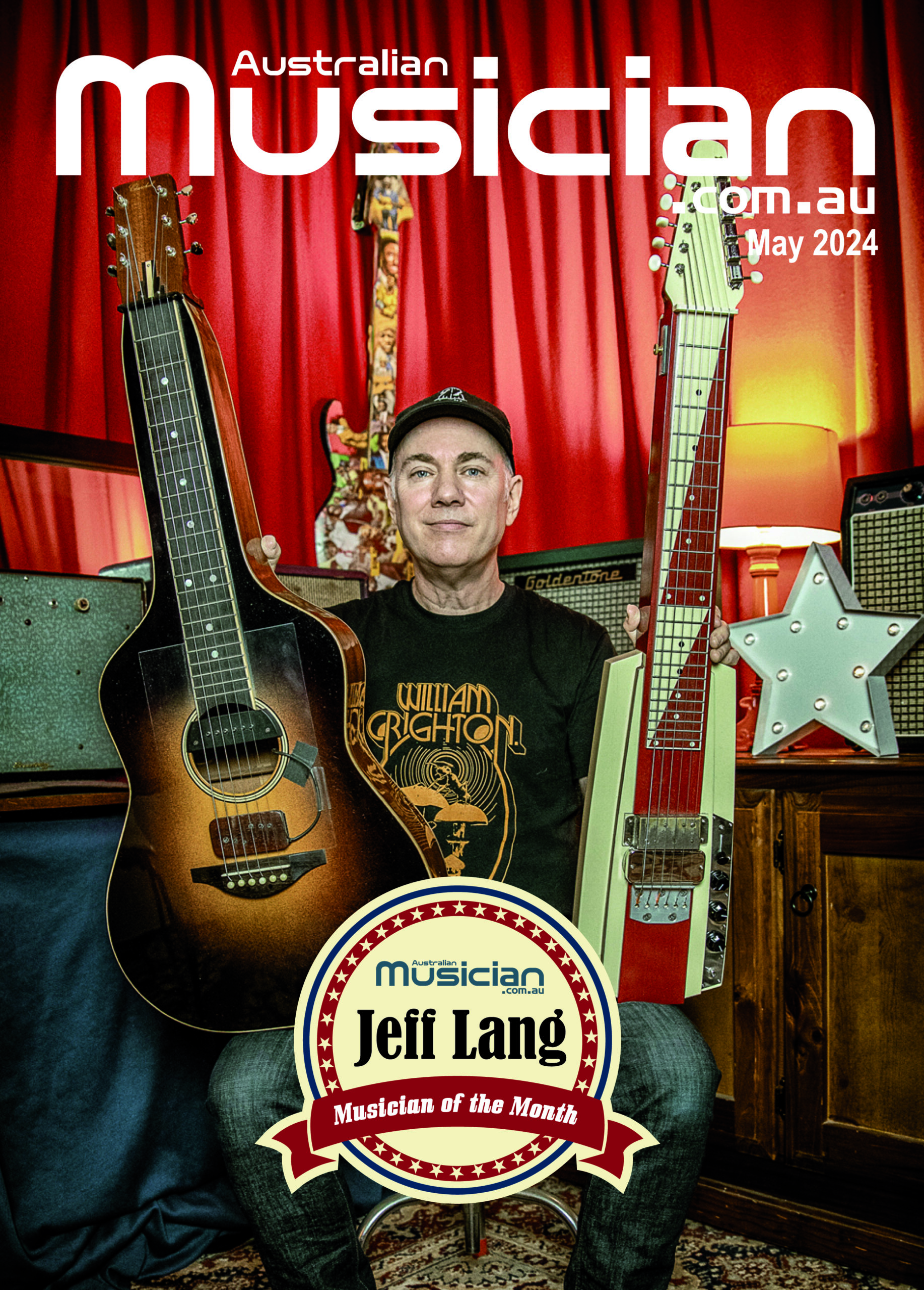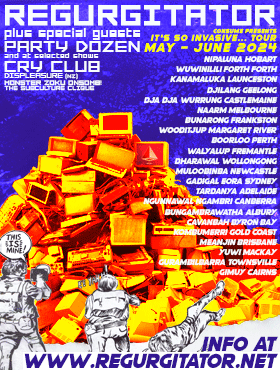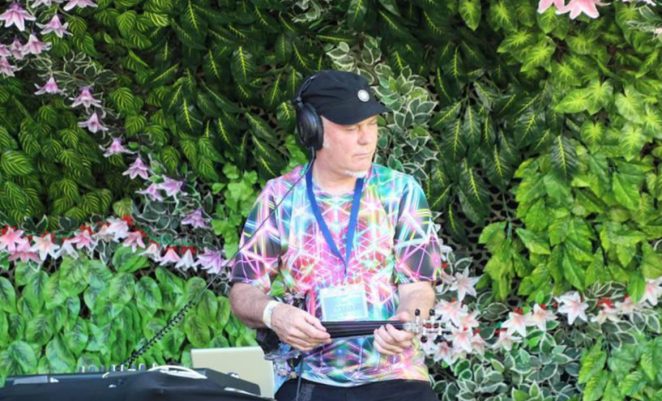
Terra Nine interview by Baz Bardoe
Long term readers will know how highly I rate Terra Nine aka Michael Westcot. He combines his accomplished violin playing with synthesis to create a very approachable and evocative kind of ‘chill’ music and I think because he is an actual musician who can play and understands composition and timbrality, he stands out from the pack. He can lay claim to at least one ‘perfect’ release in ‘Strange Craft’ and since then has continued to set an extremely high standard. With the release of his new recording ‘Laniakea’ it seemed a fitting time to catch up with him and ask all sorts of questions, not all of which are to do with music…….I think part of making intelligent music is to have many different interests and areas of creativity and thought……so make yourself a cup of tea – this will be a long one!
Can you tell me a little about why you started doing music and what attracted you to the violin? How did you then get involved with electronic music?
I learned piano formally from the age of 9 years old and so classical was my introduction to music. I was not passionate about it – but looking back, I can see that it was useful as an introduction to music in general. By the time I was 12 years old my parents could not afford my piano lessons anymore, so I was given an old violin that my Dad retrieved from the attic and was told to learn that instead (lessons were free at my new school). So began my lifelong connection to the violin. I remember being very intrigued by the ‘modern‘ music that was around me from about age 11 years old – which mainly consisted of psychedelic rock records that my older brothers and sisters brought home and the new music from a pirate radio station off the coast of NZ that I listened to (via a mono earbud) on my little crystal set radio. And then -when I was 14 years old, my big brother took me to see Led Zeppelin playing live. It was a life changing experience – seeing Jimmy Page play his electric guitar with a violin bow – WOW ~I was hooked!!! From that moment on, I tried to wring as many weird harmonic twisted notes as possible from my old acoustic violin…and as soon as I could afford it (in my early twenties) I switched to an electric violin and restrung it as a viola (less ‘squeaky’ more mellow). That said, I did not start playing professionally until my late twenties – but that is a very long story, involving a rock band that did pretty well at the time but broke up ignominiously after touring relentlessly as support act for Icehouse and Real Life.
The subsequent ‘rock band’ break-up was followed by a life changing discovery of ‘real’ dance music: it took place as a near religious conversion in the dead of night at a warehouse party in 1991. After hours of insufferable handbag house and mind-numbingly repetitive techno, a new DJ came on and exposed me to breakbeat trance. There were no questionable substances involved (I did not do that sort of thing by that time) and I do not now even remember the track that was played. But it hit me in the heart like an arrow – and I instantly and instinctively started to move to it.
I was close to tears as I realised the new direction my creativity needed to go in was revealed to me. Then hunting around in record stores I discovered The Orb, Orbital, 808 State, Future Sound of London, Opus 3, Jah Wobble, Material, Meat Beat Manifesto and Youth (to name a few) in the early nineties. That really removed the blinkers of a heretofore rock muso who ‘hated’ the disco dance music of the 70’s and 80’s. My new found interest in electronica led to a 10 year involvement with the seminal electronic collective, Clan Analogue and my earliest electronic solo project, Holy Terra (hard as nails tech trance) was launched, followed by Terra Nine (more chilled but still trancey) in the late nineties.
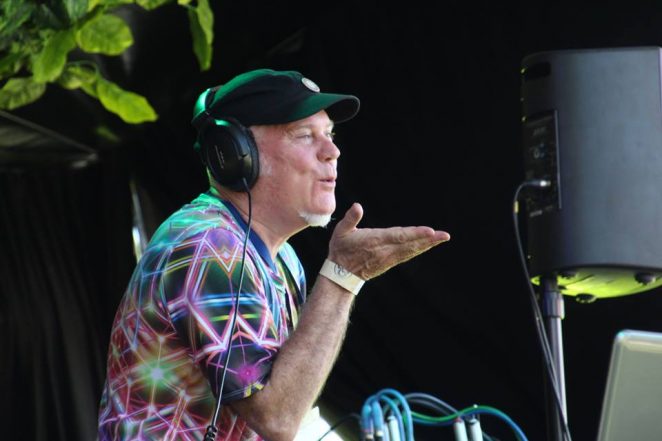
How has your career progressed? Can you tell me a little about your earliest releases and how you have come to be involved with Iboga which most recognise as a pre-eminent label in the genre?
My first electronica release was a cassette called ‘Music for Aliens’ from my act Holy Terra. However, I soon changed the name to Terra Nine and I came out with a few releases in the late nineties and early noughties, but I do not like to even think of the production on those early CDs! So enough said there!
It was not until 2007, with the release of the Terra Nine album Strange Craft, that I really nailed my ‘sound’. By this time, I had relocated to the Southern end of New Zealand (but moved to Auckland 9 months later – too bloody cold). Strange Craft was released on the Tempest label (part of the CUT label group) and quickly gained some traction overseas – in Europe in particular. So I started touring there in the following year and things took off from there, with more shows every year and a new album every couple of years with compilation releases remixes and so forth. One memorable track was dub maestro OTT’s remix of the Terra Nine track, ‘No Return’. Ott just showed up from the back of the crowd as I came off stage at a festival in Spain called Al Andalus and said he really liked what I was playing and he would like to remix one of my tracks. He thought that what I was doing was really original and he wanted to work with me.
I was pretty blown away. Since that time, I have worked with a great many amazing artists and needless to say, I am super grateful for the opportunities I have had. I moved labels in 2011 and ended up releasing on Altar Records for the next 5 years or so with an album and numerous EPs and compilations on that label along with a very active touring schedule – both in Europe and closer to home.
Things are going pretty wellthese days, with 2 EP releases on Iboga Records and a third release – either an album or an EP in the pipeline over the next 6 months. Plus a number of bookings every year across Europe and closer to home.
I first met the manager of the Iboga Chill label when I was playing at Rainbow Serpent festival back in 2016. He was DJ ing on stage right after me and as I went up to him to give him a business card, he said ‘I know who you are and I am going to release your next EP’-which turned out to be the ‘Heart of the Matter’ EP which came out in January 2017.My second release on Iboga, the Laniakea EP, was just released in Mayof this year. I have to say that two years and two releases on (plus a couple of Iboga compilations, my relationship with Iboga is very good and am working on a third release. It could be an EP – but given the number of tracks and long track lengths of some of them, it could be an album. I do have a name for it now: Eternity after the title track – so watch out for that one – probably in early 2019.
The electronic music genre is increasingly populated by people with no actual musical ability. Since you are a competent musician, have you ever pondered doing something in a fusion vein ala Jean-Luc Ponty? Or another genre?
After years of writing music on a computer and then processing my viola solos beyond recognition using such programs as ‘Stutter Edit’ (Thank you BT – my plugin God) I have to say I could never go back to conventional viola or violin playing. No offense to Jean Luc Ponty – I bought all his albums through the 70s (during my jazz rock phase) and marvelled at his prowess when I saw him live.
But the post punk era saw me listening to XTC, The Cure, Laurie Anderson, Souxsi and the Banshees, Japan, Talking Heads and many other acts that (at least initially) lacked the ‘chops’ but had something else – a special ‘magic’ that was not delivered through virtuosity but through a willingness to experiment with sound.
Early Pink Floyd did the same sort of thing in Piper at the Gates of Dawn, Saucerful of Secrets, Ummagumma and Atom Heart Mother. I remember Laurie Anderson saying she really had no idea how to work her electronic equipment all that well – instruments like the synclavier and vocoder, but that was part of her ‘charm’. Also she had an amazing ability to choose other musicians – like Adrian Belew – who were known for their special ability to play experimentally. He used to make notes totally using feedback alone – standing in one position relative to his amp gave him an E, standing somewhere else gave him G# and so on. Amazing work – THAT is what excites me rather than the ability in myself or others to simply ‘play fast’.
I really feel that electronica is my domain these days – there is SO much musical territory to explore – I have only scratched the surface. Sometimes I feel like I am trying to paint an actual ‘place’ with my music. This happens especially with my Terra Nine chillout tracks, but also with my Sirius Music trance tracks – the feeling of being in some interstitial magical world that I am privy to and must try to capture a snapshot of.
The advent of highly portable computing has meant that more people than ever have access to programs that allow them to piece together electronic based music. There is a vast glut of ‘adequate’ music out there which makes it very hard to find the good quality material. What are your thoughts on this?
There are and always have been people – some famous – some not – who have written mediocre music. It can be said that such folk finally have their ‘voice’ through direct releasing and marketing on line without a record company to ‘weed them out’. I think if you look and listen carefully you will find the gems.
Please run us through your music making set up for both studio and live.
It is really the same for both studio and live (no Ableton for me – yet lol). I run Cubase 8.5 on a Toshiba i7 Laptop quadcore 2.6 GHz with 16 Gb of RAM – plus a bunch of plugins – including Omnisphere, Alchemy (personal fav), Albino, Massive and so on – with a huge complement of FX – and since buying Serum I definitely need an upgrade because it grinds to a halt whenever I use it to play chords! On the fiddle front, I have a Ted Brewer Perspex electric violin, strung as a viola that lights up when I play it which is pretty cool. I put this through a crybaby ‘miniwah’ (it is awesomeness and only weighs 300g) and then through an Adrenalinn II guitar FX box. This then passes into my sound card (an old Tascam Mk 2 – tried and true) for recording violin parts. I also have a Novation controller keyboard – and all of these are connected into 2 of my USB ports, along with the Cubase dongle (which takes up a whole port to itself).
Your new release is a very strong piece of ambient based electronic music – can you tell me a little about it in terms of the methodology you employ approaching a new piece of music and how you go about collaborating? In short what is your creative process? (I know …a ridiculously vague question!)
Well – for the Laniakea EP, there is a story behind all of the tracks – and the process was different for writing each one. As an example, the first track – Sjela (means soul in Norwegian) was a remix that I did based on multi-tracks that were sent to me by Norwegian chillout maestros, Marve and Spira from Trancient Dreams. Actually a fair bit of the music in those multitracks dated back to recordings I made with them 8 years previously when they lived in High Wickham, UK. I did not know that they were recording all of our jams at the time and these recordings were in fact lost for 8 years on a broken hard drive. But my friends got the HDD going again long enough to retrieve the data in 2015 – and they then worked on the multi-tracks, which featured their trademark gorgeous lush pads and an amazing throbbing sub bassline, in addition to my viola parts. So I added new viola parts and a rhythm section and gave the whole thing some structure and thus Sjela was born.
While writing this track, I really had the sensation of painting a mysterious impossibly beautiful place… Upon listening back, after playing the viola part through the Adrenalinn box which added a moving filter modulation to each bowed part, the tune reminded me of sailing under an amazing starry sky in a little sail boat off the coast of Hawaii. Music is a very visual experience for me! Anyway, I am certifiable, so let’s forget all that cosmic stuff. But I should also mention that I always compose and play while I am dead straight (maybe one glass of wine) – so take that any way you like J. The second track on the EP, Holy Mountain, was a collaboration of a more direct kind. My dear friend Louis Roquefere from Suduaya was over in NZ for a holiday and we spent a few afternoons jamming together in my studio – and Holy Mountain was the result. Actually there are now 2 beautiful versions of Holy Mountain, because he remixed the multitracks in a different way to me and the result was 2 distinct but beautiful tunes.
All the other tunes on that EP: Laniakea, Dancing and Strange News from Another Star were penned by myself alone – but the process was somewhat different – for me these were like taking dictation – from who? From where? Who knows? But there was again the sensation of painting a really beautiful place – giving voice to a certain lovely feeling inside.
All in all – I feel that for me, the composition process is like a combination of mining for diamonds (looking for the right riff), making wine (you sometimes have to lay the tunes down in the cellar for a few weeks) and sometimes – taking dictation.
How would you describe the style of music you are doing with Terra Nine and what is the attraction of this style of music?
I would describe it as psychedelic first and foremost, then chillout – but this is in itself a mixture of so many styles: breakbeat, dub, slow trance…but what I like about it is that it is not so constrained in form as trance for example. Like the ‘sonata form’ of 18th to 19th century music, trance has loads of rules and regulations that the truly great electronic artists of that genre do regularly ‘bend’– but only so much. With Chillout – the rules are already broken – for me anyway – although there are loads of chill artists who still make what amounts to slowed down ‘trance’.
It is pleasant but it it often seems to me like its running on the spot without taking me anywhere and you get off the ‘bus’ feeling like you went ‘nowhere’. I like to think that my tracks take the listener ‘somewhere’ – at least I hope so.
When I started with ‘psy’ type dance music you would generally have a ‘doof’ area and a ‘chill’ area, and the artist was usually almost anonymous……the emphasis was on the event not the provider of music. Now you have everyone looking at a guy on stage much like a rock gig – what do you make of this? And what do you make of the increasing trend towards very specific sub-genres which may be defined by tiny details in reference to how this constrains creativity?
Well I have to say that ‘DJ worship’ as a phenomenon has been around for a couple of decades, but I do agree that at the kind of gigs we went to back in the day, that did not really occur. Today, people expect (and perhaps rightly so) to see a ‘show’ – which these days is usually supplied by ‘veejays’ – an extremely underappreciated group of ‘visual’ artists who can transform the extremely dull act of a DJ at a console or a ‘producer’ playing on a laptop (and maybe a controller keyboard) and punching the air in time to the kick drum into something worth facing the stage for. I almost never do a show without my redoubtable veejay (VJ Intellliki) who makes my show SO much more interesting!
Regarding the second question here – subgenres: well, I think these are more prevalent in areas like trance, house and techno, as well as drum and bass, hip hop, dubstep etc where the ‘form’ – just like ‘sonata form’ is very restrictive. In each of these styles, artists have hit upon a particular collection of musical events that people like – in response to that, artists write lots more of it and then ‘orthodoxy’ creeps in like a cancer. The only solutionif you want to write something ‘new’ and have it ‘heard‘by people is to split off, make your own ‘subgenre’ and often your own events. A case in point is ‘Dark Psytrance’ which came along in 2007 (maybe earlier) and which no promoters of regular psytrance would allow at their festivals – despite this style being hugely popular among 18 to 20 year olds. So they made their own events which then started to eat into the pocket books of the regular psytrance events. So eventually – out of economic necessity, dark psy stages / areas were permitted at mainstream psytrance festivals.
I remember standing outside the ‘dark psy’ area of Full Moon Festival in Berlin in 2008 listening to the dark psytrance inside – which was 170 bpm to 180 bpm inn 4/4 time – but in an indecipherable key and featuring lots of scary noises and saying to my vocalist – ‘Ahhh – the younger generation will always find something deeply offensive to their elders’. Since that time, there have numerous split-offs from the ‘dark psy’ genre itself, including ‘Forest’ – slower, more brooding and Hitech – faster and far more interesting.
I would have to say that Hitech is actually a ‘guilty’ pleasure for me and my partner/veejay Intelliki. Most of our musician friends ‘hate it’. Like Frank Zappa did to rock music and Stravinsky did to classical music and HenrykGorecki did to 12 tone music (modern classical), Hitech artists like Oversoul Project and Kindzadza are deconstructing dark psy and making it into something altogether weirder – with multiple time signature and key changes and reintroducing real music – this time for the ADHD generation. You could never get bored at a Kindzadza gig, but it is exhausting to dance to. Unfortunately, at Hitech concerts, we have found that the audience for this style seemed to be mostly preoccupied with taking selfies and live videos of each other on Snapchat and Periscope. Bit sad really – but you can faithfully say that their children will be different again – maybe to the point of returning to acoustic only Bob Dylanesque concerts with a bpm of 60 lol! Who knows? Like life in general – music styles a fluid and change is the only constant.
I lost a fair bit of interest in the ‘dance’ music scene many years back because it was increasingly informed by absurd sub genres defined by very specific details of a particular beat or sound. Worse it was increasingly the case that ‘psy’ trance type music was abandoning melody and musicianship in favour of a very narrow band of largely non musical criteria such as a particular sound etc. It seemed to me that the entire scene had been hi jacked by people with no actual musical ability, which was very much in contrast with the early stuff which was made by musicians who had adopted technology, rather than people who were just programmers. The only area where I am still seeing some creativity is in the ‘chill’ sub genre but this seems to me to be subject to the law of diminishing returns – what is your view on this?
I think that the concept of musical ‘ability’ is a strange one. It was once said that Brian Eno and Laurie Anderson were ‘non-musicians’ and in fact both of these artists actually celebrated this designation. And the people who originally made electronica in the early 90s tended to be ‘non-musicians’ in the sense that they came out of the ‘punk’ era which was definitely not noted for its musicianship or ‘chops’ so to speak. Such people generally only new 3 chords on their guitars (if they even owned one).
But punk had a creative ‘energy’ that was undeniable – a spirit of DIY that led people (who were generally on the dole and had plenty of time) to experiment with old cheap (back then) drum machines and bassline generators, like the 303 and the 808 and the 909. Such ‘music’ tended to write itself to some extent (you just hit play and edited what came out). It did not require any knowledge of musical theory – or the ability to play a regular ‘real time’ instrument. But – it was undeniably new, fresh and interesting – until it wasn’t. And like any creative movement- after the first fresh ‘real’ experience – then comes‘orthodoxy’ and then boredom. As mentioned above, I look at sub genres as a scale model of evolution and life itself – like life, music will never ever stand still.
I do believe that DIY spirit persists today with any artist who is trying to write music in a ‘new’ way. And today – just like in the 70’s, it is extremely unlikely that such artists will get signed to Sony Records and get on the ‘hit parade’ or whatever the online version that is. There was – in the late 60s, early eighties, and early nineties – a window of opportunity for truly interesting new acts to burst onto the mainstream music scene and be heard. It remains to be seen whether this is possible today. Time will tell.
Electronic music has seen a vast advancement in the technology of music making. From the synthesizer to sampling – to advanced computer based sequencing – the increments in technology have been truly amazing. Part of this has also been an evolution – or at least change – in the technology of how we listen to music. Not so long ago a record collection would take up an entire wall. We can now carry around 16,000 tunes on our laptop. How do you think this has changed the way we interact with music, and the part it plays in our everyday lives?
I think that the digital revolution has changed the way I listen to music – at least upon first hearing. Nowadays, I am more likely to hear a new track as a suggested track or link sent to me by fellow artists, rather than on radio or at a concert. Also whole albums are less prevalent. Releases tend to be as a single track or an EP, although albums do still exist -but they are much more often digital only releases rather than on a cd or vinyl.
There was a time when we found out about music via magazines, gigs, posters, and radio. There were well defined cultural sub groups associated with genres, and they would advertise themselves with patches on jackets etc. Then along came the internet and things like My Space. Today we can experience concerts on You Tube, and interact with artists on Facebook etc. I am interested in your thoughts on how technology of this type has impacted upon social organisation especially. For example we can say that punk influenced the DIY ethic and helped create a flourishing ‘independent’ music scene that divested itself of major label control. We can also observe that the punk ethos influenced a range of other lifestyle decisions, for example I tuned into animal welfare and other issues via punk. What I am interested in is how these new ways of disseminating and interacting with music might be changing the way we socially organise and interact.
The way we connect culturally is much more ‘global’ and far less ‘local’ – although ‘local’ still happens. The phenomenon of ‘flame wars’ is a case in point – and very prevalent on Facebook – people have their arguments about political and other issues ‘on line’ rather than face to face – and that lack of immediacy and intimacy means that the in-to-me-see component is missing with no ‘real’ communication – which is pretty sad.
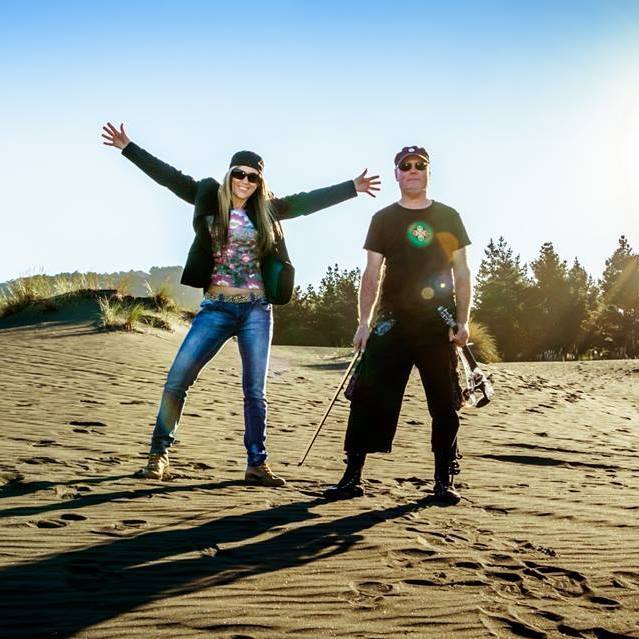
We are seeing a huge upsurge in anachronistic approaches and technologies. There is a big interest in analogue synthesis for example, and new music releases are being pressed in vinyl. Some new artists are releasing cassettes. What do you attribute this to? Is there a dissatisfaction with where technology seems to have led us?
Yes this is totally to be expected. One thing I have noticed is that the sound quality from our listening devices has deteriorated in the name of ‘convenience’.I mean – who the heck would listen to music on their phone – using their phone’s speakers – wtf? But people do and if not via the phone speaker they listen on hideous sounding and uncomfortable ear buds….or they ‘bluetooth’ the audio signal to a crappy lofimono speaker and act like it is fine…
Compared to the (clean and scratch free) vinyl we used to listen to on our friend’s Thorens turntable – through a Rotel amp and into Acoustic Research speakers in glorious Stereo or even a cd on a bog standard Sony CD player connected to a middle of the road amp with Pioneer speakers, the devices we now listen to are substandard rubbish. And don’t get me started on the ‘compression’ algorithms used to reduce the digital footprint of our music – just so we can have 10’s of thousands of songs on our mp3 players or laptops – all sounding like crap. Classic case of quantity over quality – it reduces music to ‘sludge’. I used to dream of a future where music was octaphonic surround sound or even ‘fractal’ – everywhere at once – but the future we are currently in has devalued music in the name of having lots of it. Music has been devalued, first and foremost because it sounds much worse than it did.
The advent of downloading and the ease of sharing music files has meant that sales and sales revenue have plummeted. Many record labels have closed, and even the big concerns are struggling. What do you see as being the way forward? And do you think that music has now been devalued in the sense that consumers simply no longer expect to pay for it in many instances?
I was around at the apartment of some slightly younger friends who suddenly chimed in with ‘hey – let’s get on Spotify – and listen to some ‘trance’. Five minutes later – ‘nah let’s listen to some ‘breaks’. Or – how about some ‘hip hop’? Or liquid drum and bass?’I really did not know what to say to them. I wonder how far off in some dystopian possible future, will people simply go on line and say ‘hey, let’s listen to some ‘music’? Forget all the genres -forget who actually wrote the music – just reduce it down to ‘music’. Yes – of course – music has been devalued – because people can get it virtually for free from anywhere – Youtube, Soundcloud, Spotify and so on. I can only hope that there will be a way forward, where, as musicians and composers, we can get heard – and get paid. Maybe we should simply stop releasing pre-recorded music altogether and just play ‘live’.
If someone wants to hear our music they can come see us play our latest tunes live. Even live ‘online’ – for a fee? Although then people will still record it – badly – so that would not work either.
The internet has allowed unprecedented sharing of information. But it has also allowed corporate entities to manipulate demographics and gain insights into consumer behavior that would have been difficult to ascertain previously. Taking a bigger picture beyond music, how do you see society heading in terms of this technology – generally in a better or worse direction?
Nope – I see it heading in a much worse direction if we just let it go on as it is going. Like in the Minority Report, where the guy walks down the street and all the shops call out to him – hey buddy, buy this – or hey buddy, buy that – we KNOW you like it from your browsing patterns online!
Capitalism in its current form is a cancer eating away at our planet and ourselves. It’s well past time for it to go the way of the dinosaurs – but replace it with what? Well my personal belief is that the answer lies somewhere within inside us and we can find it if we are willing to cast our awareness in the right place and raise our consciousness as a result. So I will finish on an optimistic note and hope that that will happen.
Album review : Terra Nine – Laniakea
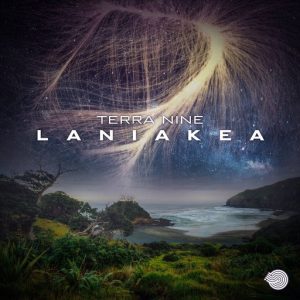 On his new recording Terra Nine aka Michael Westcot raises the bar yet further for the chillout genre. It is actually quite difficult to review without resorting to what sounds like clichés because it really is perfect. Westcot combines organic instrumentation in the form of his own violin playing which is often deeply processed, with synthesis. The result is a sound which is far more ‘human’ that much of the electronic based music doing the rounds these days. Pioneers like Tangerine Dream could actually play a bit and I think this is the key difference between Terra Nine and most others in the genre. He is not just a very good programmer – he is a player and composer of considerable ability. What also helps his case is a strong grasp of timbrality – he understands the dynamics of sound. On this release he has collaborated with artists I am unfamiliar with but the result is another outstanding release.
On his new recording Terra Nine aka Michael Westcot raises the bar yet further for the chillout genre. It is actually quite difficult to review without resorting to what sounds like clichés because it really is perfect. Westcot combines organic instrumentation in the form of his own violin playing which is often deeply processed, with synthesis. The result is a sound which is far more ‘human’ that much of the electronic based music doing the rounds these days. Pioneers like Tangerine Dream could actually play a bit and I think this is the key difference between Terra Nine and most others in the genre. He is not just a very good programmer – he is a player and composer of considerable ability. What also helps his case is a strong grasp of timbrality – he understands the dynamics of sound. On this release he has collaborated with artists I am unfamiliar with but the result is another outstanding release.
When Terra Nine released ‘Strange Craft’ it represented a quantum leap forward compared to his previous releases, and since then he has continued to move onwards and upwards. Few artists can claim to have released a perfect recording relative to the genre they operate in, but I think Terra Nine can lay claim to such a release on at least one occasion and probably more. Evocative and mysterious with a superb balance of sounds, composition, instrumentation and production this latest offering is every bit as brilliant as we have come to expect.
A few Terra Nine links:
www.facebook.com/terra9music/videos/10156776941769050/
www.soundcloud.com/terranine
www.youtube.com/user/Terra9Nine
www.reverbna3on.com/terranine

